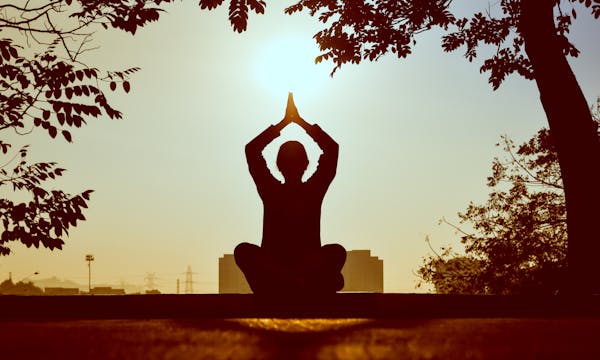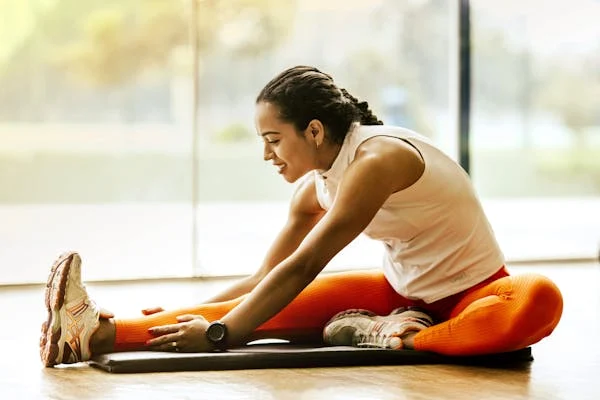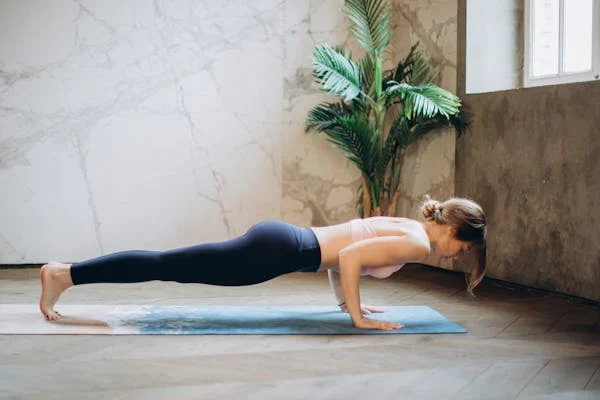
Table of Contents
Introduction
Yoga for Beginners, everyone desires success and prosperity in all spheres of life. In such a chase towards personal and professional success, what is extracted as a price is endless stress, anxiety, and burnout.
While trying to juggle life’s responsibilities all at once, it may be quite difficult to be balanced. However, there is one very powerful practice that helps in linking our personal well-being to our professional aspirations.
This ancient discipline brings about a lot of changes, not solely to your physical health but also to mental clarity, emotional stability, and overall quality of life.
For the beginner, the practice of yoga at home is an easy way of experiencing life-changing times by unlocking the secrets to personal and professional success.
In this blog, we will discuss in detail the many advantages that yoga holds for beginners, together with steps on how to get started and how to make yoga a part of everyday life for continued growth and fulfillment.
4 Powerful Benefits of Yoga for Beginners to Improve Your Well-being
1. Physical Health
Yoga has proved to be very effective in improving one’s physical health. For Yoga for Beginners in the practice of yoga, the following benefits can be derived from its regular practice:
Flexibility and Mobility: Many beginners’ poses, from Downward Dog to Cat-Cow, stretch the muscles and make them strong.
This range of motion one achieves will enhance performance in other forms of physical activities. It also reduces the risk of injury.
Better Posture and Balance: Body awareness and proper body alignment are paid attention to while practicing yoga. It can thus correct bad habits people have regarding their posture. Mountain Pose and Tree Pose provide balance and stability for everyday activities.
• Prevention of Injuries: Due to the toning of muscles and improvement in flexibility, yoga will keep such injuries at bay, especially for those who regularly engage in some form of physical activity or sport.
• Cardiovascular Health: Some forms of yoga, like Vinyasa or Power Yoga, exercise to a level that allows a cardiovascular workout, enabling the heart to strengthen and circulate blood without much problem.
Yoga for Beginners Since the heart is an organ that can be prone to a lot of problems, it forms a valid reason for one to try practicing yoga.
2. Superior Mental Health
The mental health benefits of yoga can be very deep, particularly for Yoga for Beginners going through a lot of stress and anxiety:
Lower Levels of Stress and Anxiety: Yoga, by its postures, assumes relaxation through deep breathing and mindfulness. Regular practice can lower cortisol levels in the body, reducing one’s stress levels.
Improved Concentration: The meditative attributes of yoga increase concentration and clarity of the mind. While learners begin to concentrate breathing and movement during practice, they begin to build an enhanced capability for focus in life.
• Higher Self-awareness and Mindfulness: Yoga for Beginners Different bends and asanas are practiced to make a person more connected to his inner self, thus able to reflect and understand self. Beginners tune into their bodies and their feelings at the beginning of the journey, hence developing higher emotional intelligence.
• Better Quality of Sleep: Most beginners reported how regular practice of yoga helped in sleeping better. The relaxation techniques one learns in yoga can help calm the mind by putting it to sleep.
3. Higher Energy, Better Work Performance for Yoga for Beginners
Integrate yoga into your daily routine and see your energy soar. Here’s how it does that:
• More Energy: Instead of tiring you out, yoga could actually pep you up due to the increased energies within. The gentle flow through balancing poses and restoration helps refuel the body and mind for everyday activities.
• Improved Time Management and Organization: Mindfulness developed through yoga encourages better time management skills. Most beginners would find themselves more organized and efficient in their personal and professional life. for Yoga for Beginners
• Better Problem-Solving Skills: The clarity acquired through regular practice can lead to better decision-making skills. Most beginners would approach challenges with new ease of vision.
• Increased Creativity and Innovation: It helps to unleash creative potentials with relaxation and control or focus which one gains from practicing yoga. Many have also testified to increased creativity through yoga, which can be particularly beneficial in professional settings.
4. Personal Growth and Self-Confidence
Yoga is not just a physical practice, but a journey of personal growth:
• Better Self-acceptance and Body Image: One of the first principles of yoga is to love and accept oneself. Once beginners start respecting their bodies for what they are capable of, rather than for how they appear physically, self-esteem often follows.
• More Resilient and Agile: The problems one is able to surmount in yoga, such as learning to do a challenging pose, can be applied to everyday life. Beginners learn to take on challenges and be open to new changes.
•Improved Emotional Intelligence and Empathy: Yoga for Beginners will help to build feelings of compassion and understanding towards others, developing relations both on a personal and professional level.
• Better Communication and Interpersonal skills: The more the increase in self-awareness, the better the communication skill. Many people starting with classes usually feel an increased fluency and confidence while expressing out their thoughts or feelings.


The Ultimate Guide to Getting Started with Yoga at Home for a Fulfilling Practice
1. Create a Special Space
Setting up an appropriate environment for yoga practice is very necessary for beginners:
• Choosing a Quiet and Comfortable Space: Choose an area in your home where you might flow through practices without being distracted.
This could be a corner of your living room, a spare room, or even a balcony.
• Adequate Lighting and Ventilation: Light tends to elevate one’s mood, so if possible, try and do your yoga practice in a naturally lighted room. Further, adequate ventilation is desirable in keeping the room light, fresh, and inviting.
• Getting the Right Equipment for Yoga: While one can do yoga with minimal equipment, good-quality equipment such as a good yoga mat, blocks, and strap go a long way to making a huge difference in your practice. You may want to get these to make you comfortable in your practice.
2. Building a Consistent Practice
This is how most of the benefits are obtained from yoga:
• Setting up a Regular Practice Schedule: Decide upon specific times during the week that work for you to practice yoga.
This can be as easy as 15 minutes in the morning or an hour on the weekends. Whatever it is, the point is to build consistency.
• Progressive Duration and Intensity: Begin with short practice durations and progressively include more time as well as intensity with a higher level of practice comfort created by the detailed postures.
• Record your Process: Utilize a journal for recording notes of your yoga trip. Take a note of your feelings obtained both prior and after the exercise, celebrating your progress no matter how small .
3. Choosing the Most Appropriate Yoga for the Beginners
There are various styles of yoga—some to suit different needs and some to suit certain tastes in particular. Hatha Yoga: An introductory, gentler approach to basic yoga postures and breathing exercises.
This is pretty suitable for those beginners who want to go slow in one action class. Vinyasa Yoga: This active style is to be carried in coordination with your breath as you flow from posture to posture in accord.
It could be more physically challenging, yet you could gain strengths and endurance from it.
• Practicing Yin Yoga: This restorative approach works on the connective tissue, hence excellent for relaxation and unwinding. So, it is very good for beginners who want to learn more calmly.
4. From Whom to Take Guidance
Getting started as a beginner would be much more enriching and encouraging if you get the following assistance and guidance from the proper directions:
• Becoming Part of Web-Based Yoga Communities: Be a part of any internet forum or social networking group of people who take an interest in yoga, sharing experiences and tips. This can motivate and encourage one another.
• Online Yoga Classes: Many of these websites offer classes specifically for beginners. It can create a feeling of consistency and instruction when you’re getting started off on this path.
• Asking Questions: Lastly, don’t hesitate to ask questions or seek advice from other, more experienced yogis. Their insight can be tremendously helpful when you’re having problems or developing further in the practice .
Transform Your Routine: How to Make Yoga a Lifelong, Enjoyable Habit
1. Making Yoga Part of Your Morning Routine
You can make a day positive in your life by practicing yoga during the day. This comprises the following:
• Begin Your Day with a Short Course of Yoga: Easily spend 10 to 15 minutes each morning doing light stretches and controlled breathing that might energize your body as well as your mind for the day’s events.
• Practice Yoga with Meditation or Journaling: Yoga for Beginners Make it mindful with meditation or journaling to be done at the beginning before gearing up the day. It will help you ponder and fix an intention better.
• Setting Intention and Setting Goals for the Day: Make use of your morning practice to set intentions for the day. Refine what you want to achieve personally and professionally and carry that focus through the course of the day.
2. Taking Yoga Techniques with You Throughout the Day
Yoga doesn’t need to be confined to your practice time:
Breathe deeply during breaks: These are moments in the day when one can easily practice deep breathing to de-stress the mind and set it in focus.
Incorporate simple yoga poses into your workday: Do some desk-friendly poses, such as seated twists or neck stretches, that help relieve tension and adjust posture while working.
• Stepping into Yoga for Stress and Anxiety: Whenever any aspect of your life becomes too stressful, it is the time to take a minute to stop, either to re-centre yourself with mindfulness or to do some yoga. Then, you will feel more balanced and clear-headed.
3. Living Your Yoga
Yoga is more than a practice on the mat—it is a way of living:
Budgetary and Healthy Food: Many yogis are of the opinion that a balanced diet primarily speaks through their practices. Therefore, try to include as much more fruits, vegetables, and grains into your meals.
Mindfulness and Gratitude: Be present in your daily activities. Take time to appreciate little things and be grateful for experiences.
• Care through Relaxation Activities: Show greater significance with self-care. Practice activities that feed the body and the mind. Read books, take a bath, go out, or simply enjoy nature.


Conclusion
Yoga for beginners at home isn’t just a practice; it is a way to personal and professional success. Beginning yoga practice brings balance, resilience, and clarity physically, mentally, and emotionally, which can overflow into a person’s life.
As you begin your journey with yoga, keep in mind that two very critical factors are consistency and compassion toward the self . Yoga for Beginners Set up a dedicated place to practice, find a kind of yoga that speaks to you, and support yourself with the community that goes with it.
Infuse your life with yoga; it has a magical way of transforming your body, mind, and soul.
